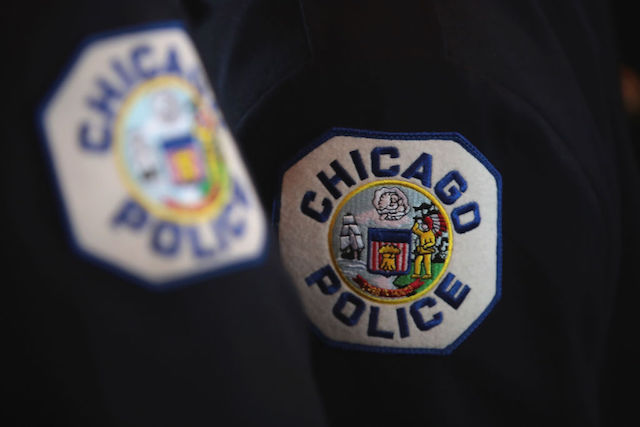Report: Police Department's 'Honor System' For Overtime Turned Out To Be A Bad Idea
By Emma G. Gallegos in News on Oct 3, 2017 9:33PM

From a recent graduation ceremony (Photo by Scott Olson/Getty Images)
A scathing audit from Inspector General Joe Ferguson reveals all sorts of abuse of overtime for officers in the Chicago Police Department, which has blown through its OT budget for six years in a row. The audit says that "inefficient management of overtime has potentially created millions in wasteful spending, an unchecked culture of abuse of the overtime system, and exhibited insufficient safeguards for officer health, wellness and performance."
The report (PDF) examined overtime practices for 2014 through the first half of 2016, and it focused on regular overtime, not the "special duty" overtime that includes when officers are called in during unusual circumstances. The report found that there is little to stop police officers from milking and bilking the system for extra pay. The audit named all sorts of tricks that officers use to get more overtime. For one, the report found that 99.4 percent of overtime entries—representing $225.5 million—listed vague reasons, if any, for the overtime, which made it nearly impossible to analyze whether the reasons were legitimate.
The report says that change needs to come from the top and that the timekeeping system needs to be modernized. Right now most "regular duty" overtime is kept track of manually, which is costly and inefficient. The department pays 61 timekeepers $7.2 million (which doesn't include support staff) for a system that has no back-up and isn't easy to monitor. In the meantime, the department's plans to switch to an electronic system are moving along at a glacial pace: the current goal is 2019.
The police department's First Deputy Superintendent Kevin Navarro told Crain's that the department said that the department is tightening up procedures. However, he told Crain's the department "is confident that the vast majority of its overtime is legitimate, reasonable and necessary."
But the report documents many instances of fraud and abuse. Almost $1 million of overtime came from members who authorized the overtime for themselves, essentially assuming the honor system would work. Almost $40 million in overtime was approved by peers or subordinates. There were 600 times that CPD members approved overtime for each other at the same time.
The report found that there was a lot of abuse of what is called the minimum time provisions, which is a policy that came out of the collective bargaining agreement. It's supposed to help pay for travel time for officers driving out to a work site. But the report found that officers were being credited for three hours of work when they had only completed 15 minutes of actual work. It was also inappropriately used to credit department members who took phone calls or emails. That cost the department at least $36,334 but since bookkeeping is poor, it may be as much as $1.2 million.
The audit found that it wasn't uncommon for officers to take on work unnecessarily to receive overtime. For instance, at the end of their shift, officers would escalate a situation or respond to a call instead of allowing officers who just begun their shift to take it. Some would ask to be included on an arrest report where they had done little, if anything, in the hopes they would be called to court and receive overtime. Some appointed themselves DUI experts so they could be called in to court to testify on cases they weren't involved in at all. Some stayed in court longer than they were needed to receive extra overtime. Each of these practices are common enough to have their own nicknames: "trolling," "paper jumping," becoming a "DUI guy" and "lingering," respectively.
“CPD’s management of overtime speaks directly to how inefficient management can lead to wide scale waste and a culture of abuse,” Inspector General Ferguson said in a statement. He added that he hopes to inform the larger conversation about funding and staffing for the Chicago Police Department:
“Addressing the management issues identified in the audit may yield multiple benefits to residents, City Hall and taxpayers alike, including : (1) resolving the long-running debate about the necessary size of the sworn force; (2) identification of fiscal resources needed for the broader department reform efforts underway and that will continue under the terms of a consent decree in the future; and (3) better assure that officer workloads are managed to levels that assure their well-being and optimal service to the public.”